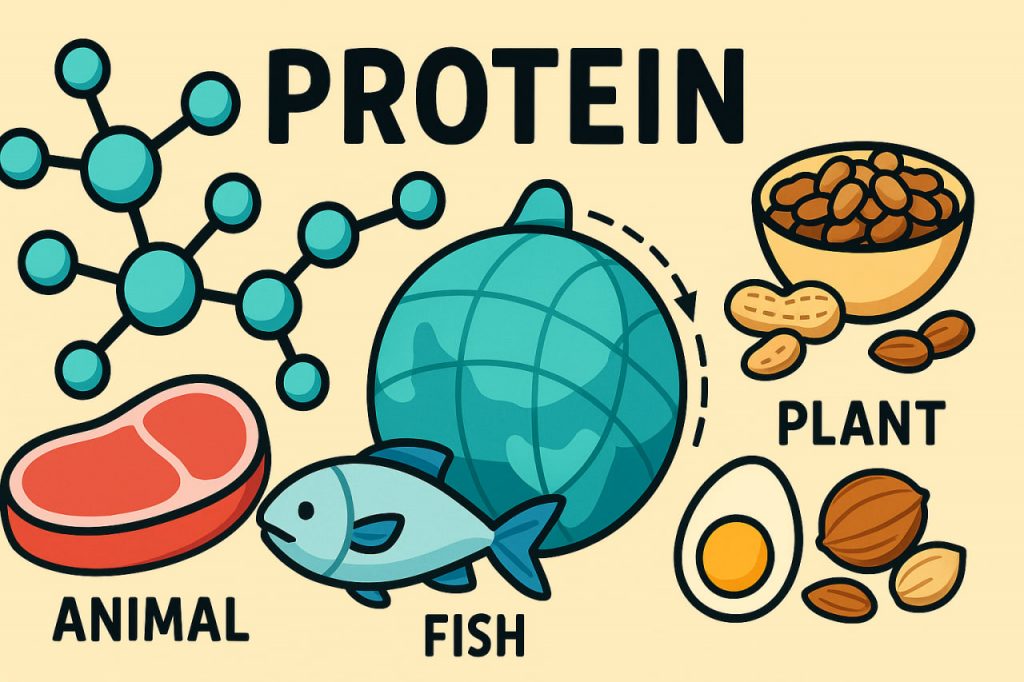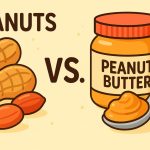Protein is one of the three essential macronutrients, alongside carbohydrates and fats, that form the foundation of human nutrition. Unlike the other macronutrients, proteins are primarily responsible for building, repairing, and maintaining tissues in the body. They are made of smaller building blocks called amino acids, which act like Lego pieces that can be arranged into countless structures necessary for life. Understanding what protein is and why it is important helps explain its central role in both biology and human health.
Structure and Types of Protein
Proteins are long chains of amino acids folded into complex shapes. There are 20 different amino acids, 9 of which are considered essential because the human body cannot produce them and must obtain them through food. Depending on their structure and function, proteins can serve as enzymes, hormones, transport molecules, or structural elements in cells. For example, hemoglobin transports oxygen in the blood, while collagen provides strength to skin, bones, and connective tissues.
Biological Functions of Protein
Protein is vital for nearly every biological process. Enzymes made of proteins speed up chemical reactions that would otherwise be too slow to sustain life. Structural proteins give cells and tissues shape and stability. Other proteins act as antibodies, forming the immune system’s defense against pathogens. In muscle, proteins like actin and myosin enable movement by contracting and relaxing fibers.
Sources of Protein in Nutrition
Protein can be obtained from both animal and plant sources. Animal products such as meat, fish, eggs, and dairy provide complete proteins containing all essential amino acids. Plant-based sources such as beans, lentils, nuts, and grains may lack some essential amino acids but can be combined to form a complete profile. For example, rice and beans together create a balanced amino acid mix. This makes protein accessible for all diets, including vegetarian and vegan lifestyles.
Daily Needs and Deficiency Risks
The recommended daily protein intake depends on age, activity level, and health condition. On average, adults require about 0.8 grams of protein per kilogram of body weight per day. Athletes and physically active individuals may need more. Protein deficiency, though rare in developed countries, can cause muscle loss, weakened immunity, and impaired growth in children.
Protein in Modern Health and Fitness
In recent years, protein has gained attention in sports nutrition and weight management. High-protein diets may help with satiety and muscle maintenance during weight loss. Protein powders and supplements provide convenience for those who struggle to meet their daily intake through food alone. However, experts emphasize that a balanced diet with varied protein sources is generally the best approach.
Conclusion
Protein is far more than just a nutrient; it is a cornerstone of life itself. From enabling vital biochemical reactions to building strong muscles, bones, and tissues, protein plays a role in every system of the body. Whether consumed from animal or plant sources, adequate protein intake is essential for health, growth, and survival.
Interesting Facts
The word protein comes from the Greek “proteios,” meaning “of prime importance.” This reflects its vital role in nearly every biological process. On average, an adult human body contains about 10,000 different proteins, each performing unique tasks—from transporting oxygen to repairing tissues. Some proteins, like enzymes, speed up chemical reactions by thousands of times, while others, like antibodies, defend against disease. Interestingly, proteins are so essential that they make up roughly 20% of the body’s total mass, second only to water. Without constant protein synthesis, muscle loss and weakened immunity begin within just days.
Glossary
- Protein – A macronutrient made of amino acids that builds and maintains body tissues.
- Amino acids – The building blocks of protein, with 20 types in total.
- Essential amino acids – Amino acids that cannot be made by the body and must be obtained from food.
- Enzymes – Proteins that speed up chemical reactions in the body.
- Collagen – A structural protein providing strength to tissues.
- Hemoglobin – A protein in red blood cells that carries oxygen.


